SCREENING



Fall is in full swing at the Foundation. Your support brought us a record-breaking Annual Gala and a month of informative content for Breast Cancer Awareness Month. We’re thankful to have you on our team so we can continue making advances in the prevention and early detection of cancer.
This year, over 290,000 Americans will be diagnosed with breast cancer and over 43,000 will die of the disease. It’s important for all of us to remember that behind every data point is a person, and their loved ones who care for them.
What we may not easily see in these numbers are the disparities, access challenges and knowledge gaps that exist surrounding routine cancer screenings. A recent Prevent Cancer Foundation survey found that 42% of women don’t know how often they should be screened for breast cancer. It’s a disheartening fact, and one we’re working to change.
From “A Guide to Preventing Cancer” to our facilitator’s guide on breast health education, our research, education, outreach and advocacy efforts are designed to help you take charge of your health and encourage others to do the same.
Early detection saves lives. So, the next time you’re scheduling your routine cancer screening, remind a friend or loved one to do the same. Let’s continue saving lives across all populations through cancer prevention and early detection so we can dare to imagine a world where no one dies of cancer.
On September 15, the Prevent Cancer Gala raised over $2.22 million at the National Building Museum in Washington, D.C.—the most the event has raised in its 28-year history! In its tradition of honoring a country that shares its commitment to fighting cancer, the Foundation paid homage to Australia with the Gala theme, Bounding Ahead. The Foundation honored His Excellency, Ambassador Arthur Sinodinos AO and Mrs. Elizabeth Sinodinos, both of whom were in attendance. Ambassador Sinodinos spoke during the programmatic portion of the evening, touching upon his personal experience with cancer and how it has shaped the way he works with those battling cancer in Australia. “I have also found a new purpose as a cancer survivor, putting back into the community that kept me alive,” he said.

Proceeds from the Gala will support Foundation programs, including research grants and fellowships and community grants. Funds will also support many of the Foundation’s public education campaigns, such as “Back on the Books,” which encourages everyone to schedule their routine cancer screenings, and “Too Young for This Sh*t,” which educates the public about the rise of colorectal cancer in young adults.
Jody Hoyos President and COO
Research shows that up to half of all cancer cases are preventable with the knowledge we have today. It can be hard to know what screenings to get and what preventive measures to take to reduce your risk or detect cancer early, but having that knowledge can save your life. Early detection increases the likelihood your treatment would be successful. That's why we’re introducing a new, comprehensive guide offering guidance on lifestyle behaviors, screening recommendations and more.
“A Guide to Preventing Cancer” is designed to help you take charge of your health, highlighting:
» Top cancers affecting each age group;
» Lifestyle and wellness tips to prevent cancer;
» Crucial guidelines on how you can stay healthy through self-exams, diet and lifestyle
» The screenings and vaccinations you need at every age;
» Information on cancer risk for racial and ethnic minorities;
» The rule to use when looking at moles during monthly skin exams;
» Information on the viruses that can cause cancer and when to get the vaccinations to prevent them;
» Risks for colorectal cancer;
» How to prevent liver cancer and what screenings/treatments are available;
» The many factors that can contribute to lung cancer risk;
» And more.
The Guide also includes “snapshots” highlighting what cancer screenings are available for various cancer types and when to schedule them.
Since the start of the pandemic, many Americans have missed or did not reschedule routine cancer screenings, doctor appointments and vaccinations. But putting off your routine screenings may put your health at risk. It’s time to get Back on the Books and schedule your routine cancer screenings and other health appointments today.
To download your free copy of “A Guide to Preventing Cancer,” visit preventcancer.org/guide.
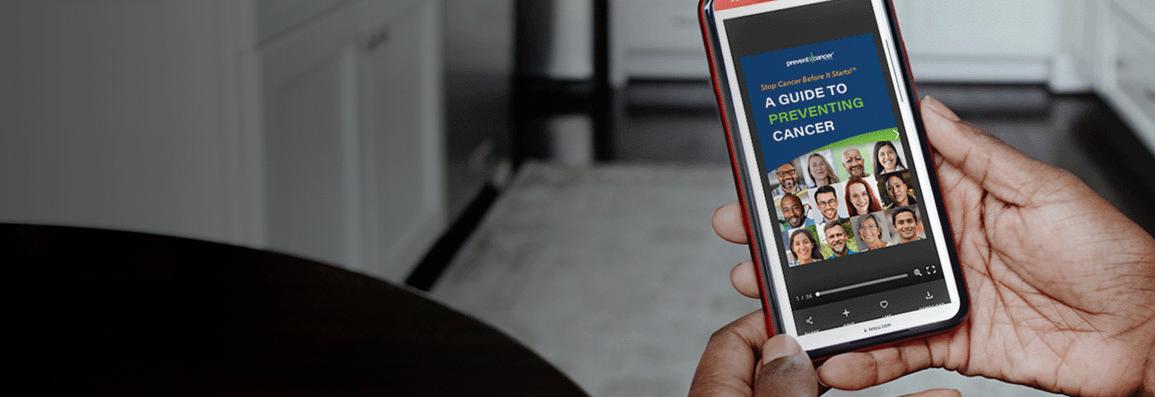
On July 7, the Centers for Medicare and Medicaid Services (CMS) released proposed changes to the 2023 Medicare program that, if finalized, would eliminate cost sharing for colonoscopies after a positive non-invasive screening test, and would lower the minimum age of colorectal cancer screening to 45. Lowering the minimum age of coverage from 50 to 45 and providing coverage for follow-up colonoscopies with no cost sharing would be consistent with the 2021 U.S. Preventive Services Task Force (USPSTF) colorectal cancer screening guidelines. The proposal would also ensure that Medicare's coverage provisions are consistent with private insurance and Medicaid expansion plan requirements.
The Prevent Cancer Foundation celebrates the proposed policy changes and supports increasing access to screening for colorectal cancer. With screening, we can prevent colorectal cancer (by finding and
removing precancerous polyps) or detect it early, which provides the best chance for effective treatment and a better quality of life for patients and their loved ones.
The proposed CMS policy also builds on President Biden's Cancer Moonshot plans to ensure equitable access to screening and prevention, particularly for colorectal cancer. On July 25, the Prevent Cancer Foundation and 18 other advocacy and industry leaders joined Fight Colorectal Cancer at the White House to discuss a shared response to the president's call to action to improve and increase access to colorectal cancer screening, with a special emphasis on reaching underserved populations and the 44 million Americans ages 45+ who need to be screened. Colorectal cancer community leaders urged the White House to develop a plan to get more people screened and address the inequities in colorectal cancer screening.
Although colorectal cancer is preventable with timely screening and highly treatable if caught early, one in three people are not up to date with colorectal cancer screening. This screening gap was exacerbated by the COVID-19 pandemic. A January 2022 survey from the Foundation found that one-half of Americans who had scheduled an in-person medical appointment missed, postponed and/or cancelled one or more of these appointments over the preceding two years.
Despite the availability of multiple safe and effective colorectal cancer screening options, colorectal cancer remains the second leading cause of cancer death in the U.S. for men and women combined, with communities of color experiencing
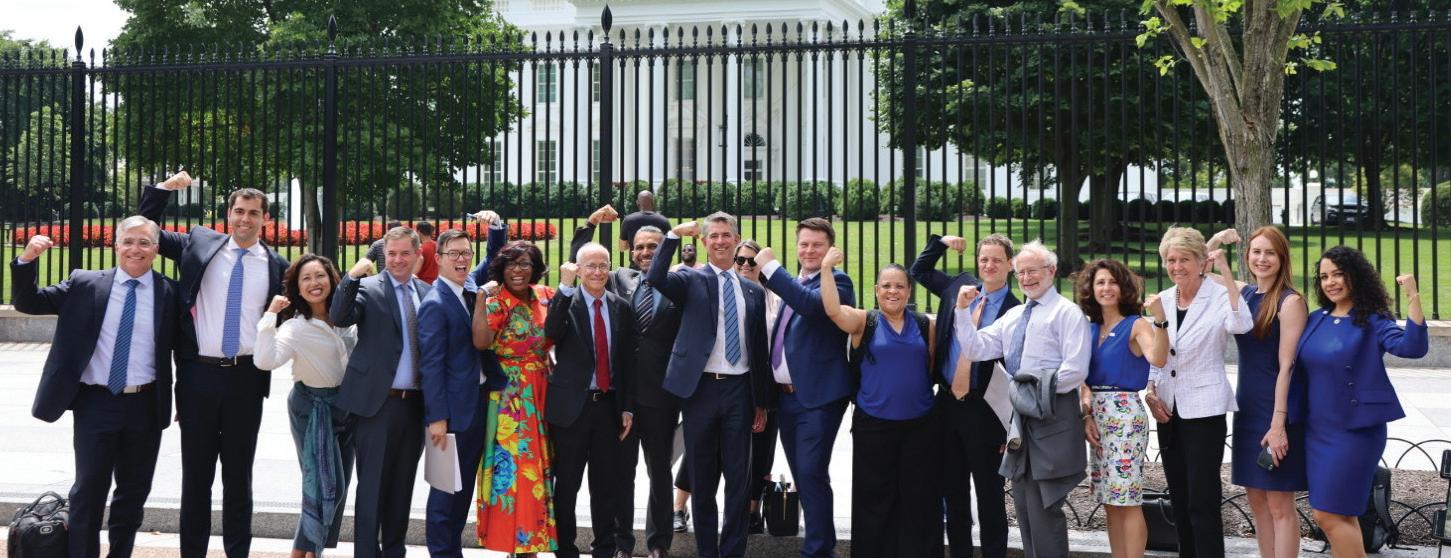
higher incidence and mortality rates. And colorectal cancer is on the rise in younger adults—today, more adults under 45 are being diagnosed than ever before. According to the National Cancer Institute (NCI), the rate of colorectal cancer in people younger than 50 has doubled since the 1990s. NCI estimates that by 2030, approximately 1 in 10 colon cancers and 1 in 4 rectal cancers will be diagnosed in people under 50 years old.
Visit tooyoungforthis.org to learn more about early-onset colorectal cancer. It’s important for all adults to learn about colorectal cancer prevention and early detection, and the signs and symptoms of the disease.


A new survey by the Prevent Cancer Foundation reveals an alarming statistic: almost half (49%) of American women 40 and older report they have not had a breast cancer screening in more than two years. Of these women, 57% have never had a breast cancer screening or have not had a breast cancer screening in six or more years, and 22% cite a lack of symptoms as the reason for not having the screening. Women of average risk should begin breast cancer screenings at age 40 and continue to get screened annually.
The survey also revealed that over half (56%) of women 21 and older have not had a cervical cancer screening since March of 2020, with 18% citing a lack of symptoms as a reason they have not been screened. Women of average risk should begin cervical cancer screenings at age 21 and continue with Pap tests every three years through age 29. Women between ages 30-65 should get a Pap test alone every three years, an HPV test alone every five years, or an HPV and Pap test together (co-test) every five years.

In a related survey conducted last year, the pandemic was the most-cited reason for missed cancer screenings. This year’s findings suggest other factors may be at play. For example, there is a lack of awareness regarding when to have breast and cervical cancer screenings.
• 51% of women 21 and older do not know how often they should be screened for cervical cancer.
• 34% of women 40 and older do not know how often they should be screened for breast cancer. This number has increased since last year’s survey (26%).
• The survey findings also show women are more likely to prioritize their health care once they understand the importance of early detection.
• 69% of women 21 and older indicate they are more likely to schedule their next recommended breast or cervical cancer screenings after receiving information regarding the importance of early detection.
Many women who are getting screenings report feeling positive about having them.
• Nearly 3 in 5 (58%) women 21 and older say they feel relieved, reassured, empowered or accomplished after having their routine breast or cervical cancer screening appointment.


Since a large number (71%) of women 21 and older consider breast or cervical cancer screenings to be part of their overall wellness routine, the survey investigated steps women might take to ensure they get their cancer screenings on the books.
• 55% of women indicate that associating reminders for screenings with other habits or important to-dos would make them more likely to remember to schedule their breast or cervical cancer screening.
51% of women 21 years of age or older do not know how often they should be screened for cervical cancer.
• More specifically, 23% of women say they would be more likely to remember to schedule their breast or cervical cancer screening if they associated reminders for screenings with spring cleaning.
• More than 1 in 7 (15%) would remember if they associated screenings with their New Year’s resolution.
• 42% of women say they would be more likely to follow through with a breast or cervical cancer screening if they planned a reward for themselves after going to their appointments.
Women can leverage their own understanding of the importance of preventive health care activity to promote it to other women.
• Two in five women (40%) 21 and older say they often remind their friends, family members and/or loved ones to get their routine breast and cervical cancer screenings.
• Compared to white women (15%), Black (26%) and Hispanic (24%) women more often report they have scheduled a breast or cervical cancer screening because of a powerful story shared on social media.

Find more information about early detection and cancer screenings by visiting preventcancer.org/backonthebooks
In September 2022, the Foundation commissioned Atomik Research to conduct an online survey of 2,006 women between the ages of 21 and 60 years old located throughout the United States. People surveyed include those who self-identify as cisgender women as well as transgender and non-binary individuals assigned female at birth.1
1 The sample consists of participants who were assigned female at birth or trans-male (female-to-male) in addition to cisgender women. Participants in the study qualified if they self-identified as cisgender female (N=1,991), transgender (female-to-male; N=2) or non-binary (assigned female at birth; N=13).

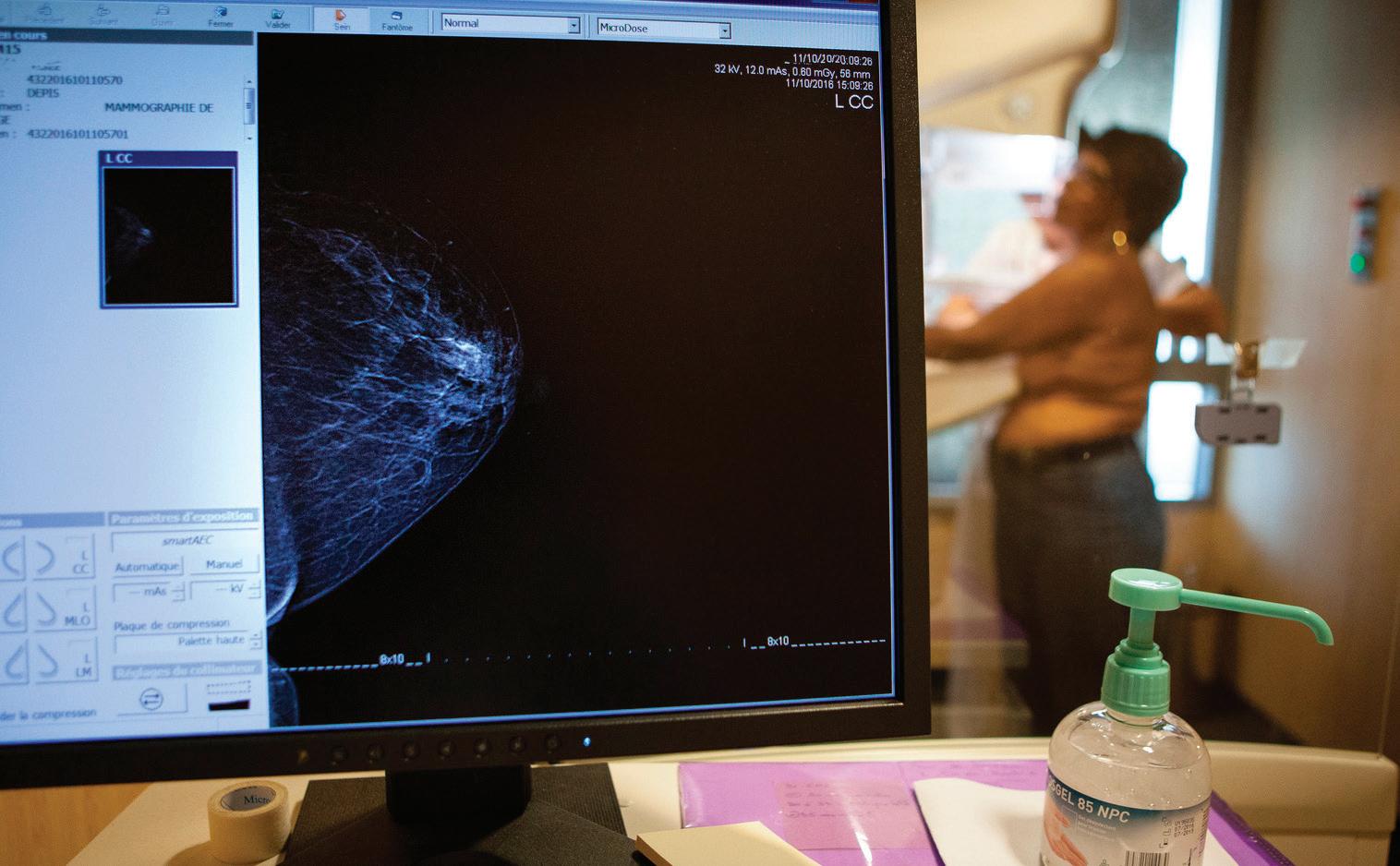
It’s a fact—mammograms are an important and effective tool for the early detection of breast cancer. But here’s another fact: A 2022 Prevent Cancer Foundation survey found that almost half of American women 40 and older report they have not had a breast cancer screening in more than two years.
It’s not surprising, since a lot of confusion is caused by lack of consensus from guidelineissuing organizations, such as the U.S. Preventive Services Task Force (USPSTF) and American Cancer Society. But the good news is that breast cancer is highly curable if found in the early stages, when treatment is more likely to be successful. Here’s what you need to know to stay on top of your breast health.
If you’re between the ages 25-39 and at average risk of breast cancer, visit your health care provider at least once every three years for a clinical breast exam and to talk about your breast cancer risk.
At age 40, you should begin annual screening with either 2D or 3D mammograms. A 2D mammogram takes a photo from above and the side of the breasts, while a 3D mammogram takes photos from a variety of angles. A 3D mammogram may be more accurate and better for a person with dense breasts; talk to your provider about which option is best for you. Once you begin menopause, be sure to ask your health care provider about how hormone replacement therapy can affect your risk.
If you have several close relatives with the disease or your mother was diagnosed before age 50, talk with your health care provider about beginning annual mammograms and/or magnetic resonance imaging (MRI) earlier. They may also recommend genetic counseling and testing to better assess your risk and screening recommendations. If you are transgender, talk to your provider about what is recommended for you.
If you’ve fallen behind on your breast cancer screening, now is the time to get back on schedule. For more information on screenings, visit preventcancer.org/screenings
Everyone loves a good charcuterie board. They’re the perfect appetizer for a group gathering or an easy no-cook meal when it’s too hot to turn on the oven. And while they can have healthy components, it’s recommended that the namesake itself—charcuterie, or processed meats—be eaten only in limited quantities, or avoided, as they may increase your risk of certain cancers.
Here are some tips to help you create a healthy and delicious charcuterie board:
Pack in the fruits and vegetables. Strawberries, cherries and grapes are great additions to a charcuterie board. Dried fruits are another way to add color to your plate. Not only do fruits and vegetables add nutrients to your spread, they also add a lot of color, an important part of any quality charcuterie board. For vegetables, cut up some carrots, celery sticks, cucumbers and broccoli.
Try some healthier cheeses. Try incorporating cottage, goat, Swiss, Parmesan or part-skim mozzarella cheeses into your board. You’ll want crackers to go with them; stick to whole wheat versions for more nutritional value.
Add nuts. Nuts, including almonds, pistachios and walnuts, are a great source of healthy fats and fiber, which may reduce your risk of cancer. Add a little extra oomph by using nuts seasoned with spices or herbs, such as rosemary.
Dips are essential. You’ll want something to dip your veggies in, of course. Hummus, a Greek yogurt dip, like tzatziki, or guacamole will add sustenance and flavor to your charcuterie board.
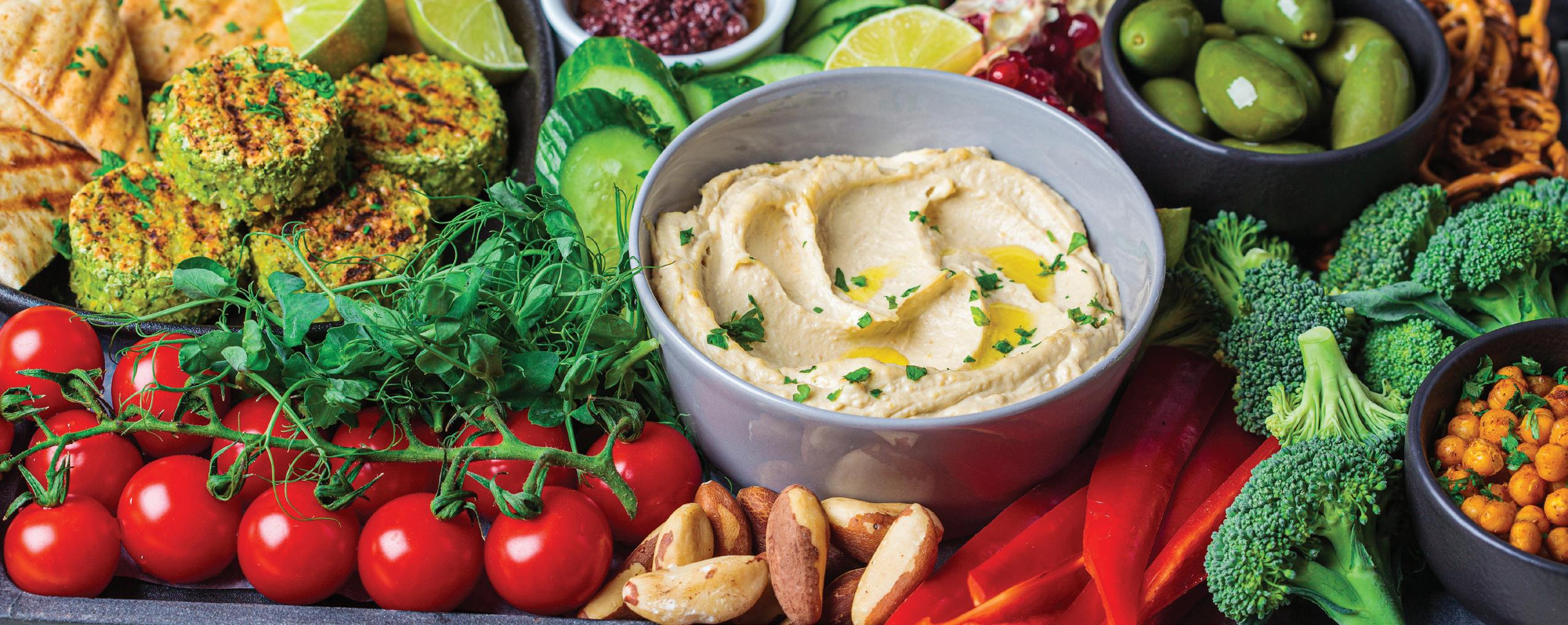
Don’t forget a touch of sweetness. Dark chocolate chips or dark chocolate-covered fruit can finish off your snack or meal on a tasty note. Dark chocolate is considered healthier than other types of chocolate.
The sky’s the limit when it comes to creating your own healthy charcuterie board. Get creative by adding any of your favorite healthy snacks that can be put in a bowl or arranged on a platter, and you’re sure to have happy eaters. If you try out a healthier charcuterie board, snap a photo, share on social media and tag @preventcancer, so we can reshare and inspire others to try.
If you have been following the Prevent Cancer Foundation’s work for a while, you have likely heard about our research program. For more than 30 years, our supporters have made an impact on cancer prevention and early detection by funding innovative projects and promising early-career researchers. To date, the Foundation has invested more than $43 million to advance cancer prevention research and support innovative tools to detect cancer early—all thanks to donors like you. Many of the researchers the Foundation has funded have gone on to become leaders and superstars in cancer prevention and early detection, or have leveraged the Foundation’s funding to exponentially grow their projects.
The Foundation is pleased to provide an opportunity for donors to be superstars in their own way by funding a named research grant. Research grant projects and fellowships are awarded for two years at $50,000 per year. Donors funding a half-year or more of these research grants can designate a grant from the current cycle in their name, in their family’s name, or in memory or honor of someone special to them.
The Foundation works to pair each donor of a named grant with a project or fellowship that they find meaningful. After the pairing is made, these donors receive special updates from the Foundation that include insights from the researcher and project updates. This work wouldn’t be possible without our named grant donors—and there is still time to make your mark on our 2023 research grants and fellowships!
If you are interested in learning more about this opportunity, you can connect with Lorelei Mitrani, Senior Direct of Special Events and Major Gifts, at lorelei.mitrani@preventcancer.org or at 703-519-2102.

“As a cancer survivor myself and a member of the board of directors, it’s been one of the things I feel has been most important to me in my life. The Foundation has given me so much more than I have been able to give the Foundation, and I’m so grateful for the experience.”
- Jeremy FitzGerald333 John Carlyle Street, Suite 635 Alexandria, VA 22314
Prevent Cancer Foundation®

333 John Carlyle St., Ste. 635, Alexandria, VA 22314
Toll-Free: (800) 227-2732 Main: (703) 836-4412 Email: pcf@preventcancer.org Visit: preventcancer.org

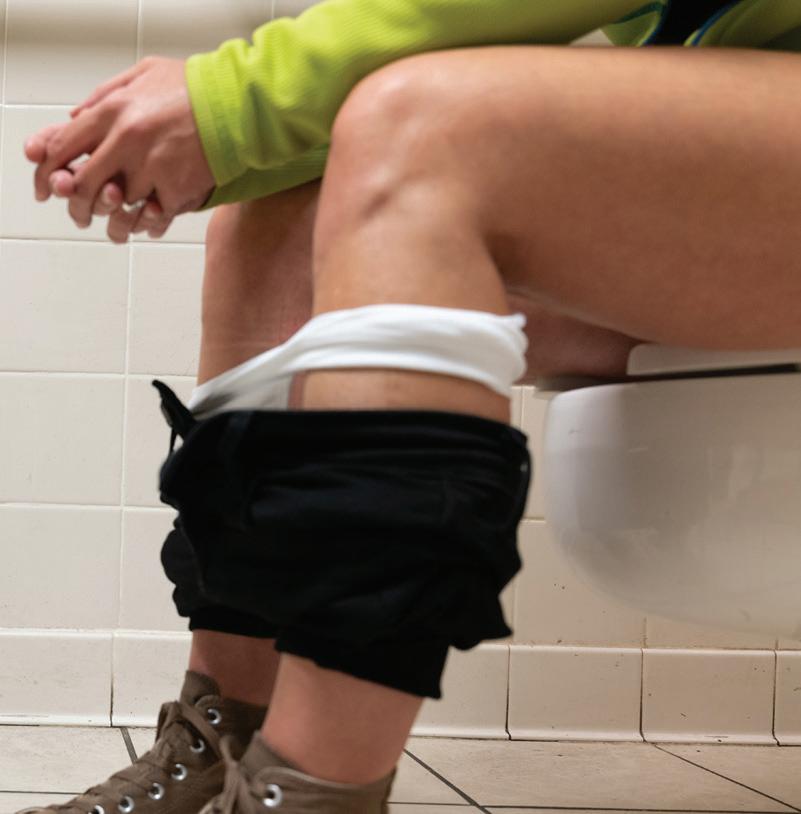
Cancer PreventionWorks is published by the Prevent Cancer Foundation®, a 501(c)3 nonprofit organization dedicated to the prevention and early detection of cancer.


All contributions are tax deductible to the fullest extent allowed by law.
